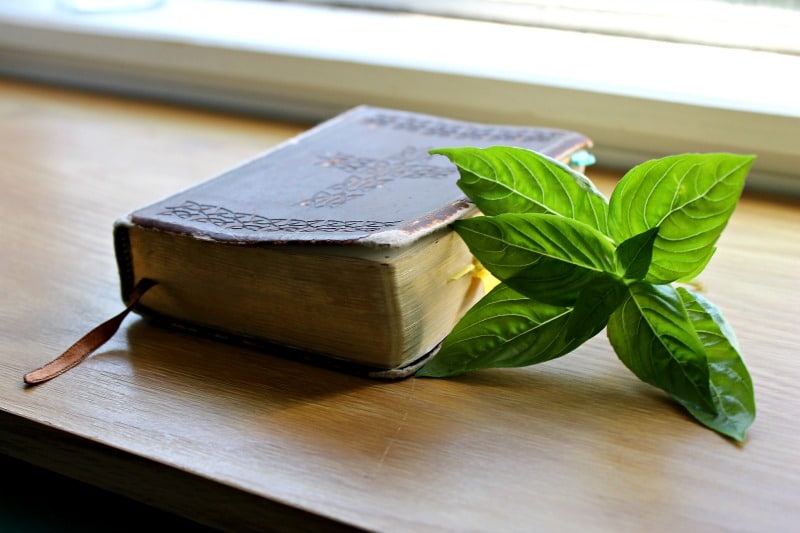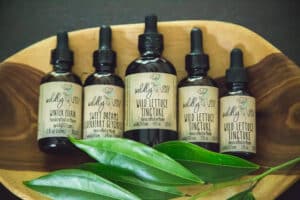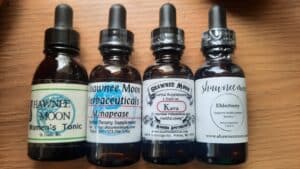Welcome back to the Shawnee Moon Blog! Today I’m going to talk about three herbs mentioned in the Bible, and why they are still significant today! Let’s get right into it!

Cassia
“All thy garments smell of myrrh, and aloes, and cassia, out of the ivory palaces, whereby they have made thee glad.” -Psalm 45:8
Cassia is one of many herbs mentioned in the Bible, and was a key ingredient used in temple worship. In Exodus 30:22-25 we see that cassia (or Cinnamon) was an ingredient in the holy oil that God instructed Moses to use in the Tabernacle to anoint the priests and all the scared vessels. It is warming and very similar to Cinnamon (they are in the same plant family). Like Cinnamon, Cassia supports healthy digestion and circulation as well and supporting normal, healthy immune function. The essential oil provides a strong, uplifting aroma and is suggested to use with lemon oil to support healthy metabolic function. (Note: Always use essential oils that are labeled for ‘dietary use’/’internal use’ if you intend to use their benefits internally. Know where your oils come from before you decide to ingest them.)
Cinnamon supports healthy appetite and normal digestion. It is also great to use in household cleaners as it is a wonderful cleanser.
Shawnee Moon products that contain Cinnamon: Apoptonic, Diarrest, Pancreas
Let’s take a moment to talk about ‘caustic’ plants.
With caustic, or ‘hot’, herbs and oils remember to dilute, dilute, dilute! “Start low, go slow”. You can always add more; it’s a lot harder to take away if you have too much. Topically, caustic substances stimulate blood flow and can cause redness and discomfort or a burning sensation on the skin if not properly diluted. If you experience discomfort, don’t attempt to wash with water! Water and oil do not mix and it will just spread the hot oil around and drive it in more. Use a ‘carrier oil’ (a fatty, bland oil, like olive oil, sweet almond oil, coconut oil, etc) on top to dilute the essential oil. I like to wipe off with a towel, then apply more of the carrier oil until the discomfort lessens. Then wash with a mild soap and hot water.
Nettle
“Among the bushes they brayed; under the nettles they were gathered together.” -Job 30:7-8
This is one of my favorite herbs as it is high in vitamins A and C and trace minerals like iron, potassium, manganese, and calcium. The fresh herb is high in vitamin K (but virtually non-existent in dried herb).
This plant is most commonly known as ‘stinging nettle’, as the stems and leaves are covered in small ‘hairs’ that upon contact, have an injection mechanism (not unlike a bee sting) that injects a histamine that causes a painful stinging a instant rash to appear. Interestingly enough, the juice of a fresh nettle plant provides the antidote for its own sting. (if you can manage to not get more stings though the process of getting juice on the first stings; good for you!).
Nettle shoots are a common spring time meal! Many people will pick the young shoots and boil them (to remove the sting) and eat it similar to cooked spinach.
This plant with all its lovely vitamins and minerals and antioxidants, provides great support for the immune system especially for seasonal support and wellness through those months where plant life thrives.
Shawnee Moon products that contain Nettle: Dandelion/Nettles, Daily Supplement, Anti-Hist, Focus, Pancreas, Pro-Red

Chickory
“And they shall eat the flesh in that night, roast with fire, and unleavened bread; and with bitter herbs they shall eat it.” -Exodus 12:8
Chicory is one (of many) possible plant that is considered one of the “bitter herbs” of the Passover. The Jews were instructed to use bitter herbs to remember their enslavement in Egypt, and be reminded of God’s faithfulness and deliverance. As mentioned in Duke’s book, Herbs of the Bible, chicory can be eaten in many ways, fresh in a salad with vinegar and oil, blanched hearts can be made as a raw or cooked vegetable. New shoots are used as animal fodder, but bitter, older tops can embitter animal milk.

Chicory root is commonly roasted and used as a caffeine free, coffee substitute. It is also suggested to blend with ground coffee to enhance the flavor and aroma of the brew. The pretty blue flowers that open in the morning and close in the afternoon can be eaten and added to salads for a splash of beautiful color.
Chicory is shown to support a healthy immune system. The bitter of this herb (and its near relatives like, dandelion, endive, milk thistle and others) stimulates natural secretion of healthy elimination tract. The compound cichoric acid has many health benefits you can research more of on your own. It is specifically mentioned to possibly support normal healthy collagen.
Currently, we don’t carry any Shawnee Moon products that contain Chicory. Do you think we should? What form/part would you be interested in?
What other herbs mentioned in the Bible would you like to learn more about?
Comment and let me know! Thanks for reading and have a great day!





